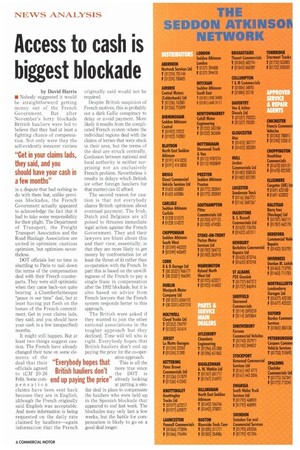Access to cash is biggest blockade
Page 8

If you've noticed an error in this article please click here to report it so we can fix it.
by David Harris • Nobody suggested it would be straightforward getting money out of the French Government. But after November's lorry blockade British hauliers were led to believe that they had at least a fighting chance of compensation. Not only were they the self-evidently innocent victims in a dispute that had nothing to do with them but, unlike previous blockades, the French Government actually appeared to acknowledge the fact that it had to take some responsibility for their plight. The Department of Transport, the Freight Transport Association and the Road Haulage Association are united in optimism: cautious optimism, but optimism nevertheless.
DOT officials lost no time in shuttling to Paris to nail down the terms of the compensation deal with their French counterparts. They were still optimistic when they came back–not quite bearing a Chamberlainesque peace in our time" deal, but at least having put flesh on the bones of the French commitment. Get in your claims lads, they said, and you should have your cash in a few (unspecified) months.
It might still happen. But at least two things suggest caution. The French have already changed their tune on some elements of the deal that their officials agreed to (CM 213-26 Feb). Some compensation claims have been sent back because they are in English, although the French originally said English was acceptable. And more information is being requested on the daily rate claimed by hauliers—again information that the French
"Everybody British hau end up payin
originally said would not be required.
Despite British suspicion of French motives, this is probably not a dark Gallic conspiracy to delay or avoid payment. More likely it results from the complicated French system where the individual regions deal with the claims of lorries that were stuck in their area, but the terms of the deal are struck centrally. Confusion between national and local authority is neither surprising nor an exclusively French problem. Nevertheless it results in delays which British (or other foreign hauliers for that matter) can ill afford.
The second reason for caution is that not everybody shares British optimism about eventual payment. The Irish, Dutch and Belgians are all poised to threaten immediate legal action against the French Government. They and their lawyers are blunt about this and their view, essentially, is that they are more likely to get money by confrontation (or at least the threat of it) rather than co-operation with the French. In part this is based on the unwillingness of the French to pay a single franc in compensation after the 1992 blockade, but it is also based on advice from French lawyers that the French system responds better to this approach.
The British were asked if they wanted to join the other national associations in the tougher approach but they declined. Time will tell who is right. Everybody hopes that British hauliers don't end up paying the price for the co-operative approach.
This is all the more true since the DOT is already looking at putting a similar deal in place to compensate the hauliers who were held up in the Spanish blockade that appeared to end last week. The blockades may only last a few weeks, but the battle for compensation is likely to go on a good deal longer,
hopes that hers don't g the price"












































































































